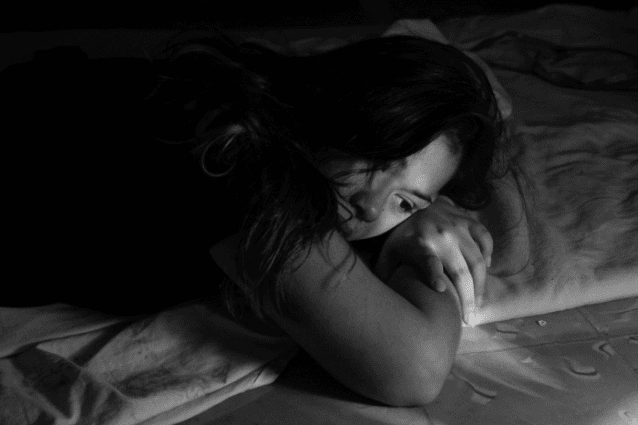Sleep is considered a peaceful time where the body and brain can rest and reset, setting you up for a successful next day. Yet, if you often wake up crying in your sleep, your night can feel anything but restful.
So, what does it mean when you cry in your sleep? The truth is that if you wake up crying, this could indicate various physical or psychological issues, which I am going to explore in more detail in this article.
I will dive into:
- Why do I cry in my sleep?
- What does it mean when you cry in your sleep?
- Who is more likely to cry during sleep?
- How to stop crying during your sleep.
Let’s get straight to it.
Why Do I Cry in My Sleep?
When babies cry in their sleep, this is usually as they transition from one sleep stage to another, such as from a deep stage to a lighter sleep stage. However, if you are waking up crying in your sleep as an adult, this could indicate a psychological disorder or deep-rooted trauma.
Before now, you may have thought, “Can you cry in your sleep?” but now you know it’s possible, you may be wondering why it’s happening. Below, I have listed the various common causes to help you get a better idea of why this is happening in your life.
1. You are experiencing nightmares
When waking up crying, psychological disorders or conditions might be the first thing that comes to mind. Yet, scary dreams that emerge in your mind as you sleep could just as easily be to blame.
While nightmares tend to occur more at a younger age, they can also impact adults. Usually, this tends to happen during stressful times. Sometimes, the brain presents these nightmares as a way to help you process or work through difficult situations. While unpleasant, you can avoid these by actively finding ways to reduce the stress in your day-to-day life.
2. You are having night terrors
Night terrors are usually marked by thrashing or sleepwalking. However, crying in your sleep may also occur. These episodes typically last a few seconds to a few minutes.
Similar to nightmares, children experience night terrors more often than adults. At the same time, it is possible to experience these episodes at any age.
3. You are grieving
Grief is a tricky thing, and these emotions can quickly become buried due to the hustle and bustle involved in your daily life. Thus, these emotions may end up releasing as you sleep. You might wake up with tears running down your face and immense feelings of sadness.
This is okay. Grieving is a natural part of losing someone and your mind will seek ways to process these emotions in one way or another, such as crying in your sleep.
However, if this is a recurring issue, I recommend seeking out help if you need it. Buried or blocked grief can eventually lead to anxiety, depression, and other mental health conditions.
4. You are depressed

While grief is often temporary and has a clear cause, such as the death of a family member or friend, depression lasts much longer and sometimes does not have a definitive cause.
Symptoms of depression may manifest as changes in your eating or sleeping patterns, as well as unexplained crying. This may also involve crying in your sleep.
Additionally, there are certain types of depression, such as diurnal mood variation, that may impact your mood more in the morning or at night. Typically, these types are associated with irregularities with your circadian rhythm, also known as your sleep-wake cycle.
5. You have parasomnia
Parasomnia is a condition where a person behaves abnormally in their sleep. Sometimes this may mean they become aggressive or upset, which may cause crying. This condition usually has genetic links. Thus, if someone in your family suffers from it, you are more likely to experience it too.
6. You are stressed
Feeling stressed or anxious and having no outlet to manage or process these complex emotions can lead to waking up crying. This often coincides with crying bouts during the day.
7. You have a physical medical condition
Crying in your sleep is not always a psychological problem. Breathing disorders, such as acid reflux or asthma, may lead babies to wake up crying more than usual. Chronic back pain or any other physical ailment in adults may also lead to waking up crying.
What Does It Mean When You Cry in Your Sleep?
For most people, crying in their sleep is a one-off occasion. If this sounds like you, it is likely due to a bad dream or nightmare and is not anything to worry about.
If you find crying in your sleep is a regular occurrence, something else might be at play, such as a serious disorder or condition. If this is the case, book an appointment with your doctor. They know you and your situation best and can help you determine a plan of action.
Who Is More Likely to Cry During Sleep?

Babies are more likely to cry during sleep. As previously mentioned above, this usually happens when moving from a deep sleep stage to a lighter deep stage. Additionally, crying is a baby’s main form of communication, which may cause them to cry during their sleep or upon waking.
Generally, older children and adults should seek out a sleep specialist or doctor if they find themselves frequently waking up crying. Doing so may indicate a disorder that requires medical and expert intervention.
Is it normal to cry in your sleep?
Crying in your sleep is not uncommon. At the same time, it is not something you should ignore or put to the side, especially if it is a frequent occurrence. You may have deep-rooted trauma or grief that you might need help with processing.
At which sleeping stage are people more likely to cry?
Most people tend to cry during their sleep when transitioning between sleep stages. This often means going from a deeper sleep stage to a lighter sleep stage, where movement is more likely to occur.
How To Stop Crying During Your Sleep
Crying in the middle of the night is very disruptive. You might struggle to fall back asleep and you might experience fatigue and exhaustion as you go about your day.
Luckily, there are things you can do about it. In my 30 years of experience as a therapist, I have found the following activities help individuals overcome sleep troubles, such as crying when sleeping.
1. Meditation

Meditation is a wonderful mindfulness practice to include in your day or during the night. It can help to calm the mind as you begin to fall asleep, allowing you to fall into a more peaceful rest and avoid waking up crying.
There are many guided meditations available for sleep. Listen to the video below for a restorative sleep meditation I put together to help people just like you.
2. Stress management activities
Stress is a natural part of human life. Technically, it is an innate survival mechanism that alerts the body to any threats. While actual life-threatening situations are less common in today’s modern era, this mechanism still remains. You might feel stressed during major life changes, such as the loss of a loved one, moving house, or starting a new job.
It is important to find ways to manage your stress and there are many different stress management activities you can try. Some popular and effective ones include deep breathing techniques or talking to a trusted friend or loved one about it.
3. Sleep hypnosis
Via a recorded session or in-person, sleep hypnosis may help you fall into a peaceful sleep. Being hypnotized puts your mind in a heightened state of suggestibility. This means that you are more likely to respond to cues such as, “Relax,” or, “Let go,” which can help you drift into a deep sleep for the night where you don’t wake up crying.
4. Seek out professional help
If crying in your sleep has become a frequent occurrence, book an appointment with your doctor. They may recommend further testing for certain disorders or they may refer you to a mental health professional to help you overcome any deep-rooted trauma.

Sleep Peacefully, Without Crying Waking You Up
Sleep is essential for optimal human health and fulfillment. Without it, it can negatively impact many mental and physical processes. You are left functioning at only a small percentage of your full capacity.
However, by finding ways to overcome crying in your sleep, you can achieve greater fulfillment, health, and happiness in your life. Harnessing the power of your mind and gaining back control is an excellent place to start. Take the first step today and try my course, Perfect Deep Unbroken Sleep.



